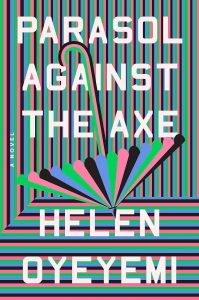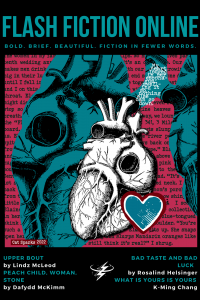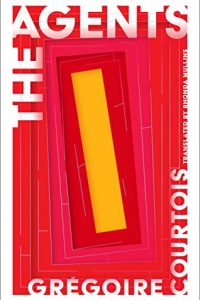Ian Mond Reviews Parasol Against the Axe by Helen Oyeyemi
 Parasol Against the Axe, Helen Oyeyemi (Faber & Faber 978-0571366620, £16.99, 272pp, hc) February 2024. (Riverhead 978-0-59319-236-8, $28.00, 272pp, hc) March 2024.
Parasol Against the Axe, Helen Oyeyemi (Faber & Faber 978-0571366620, £16.99, 272pp, hc) February 2024. (Riverhead 978-0-59319-236-8, $28.00, 272pp, hc) March 2024.
Helen Oyeyemi’s new novel, Parasol Against the Axe, takes place in Prague, Oyeyemi’s home since 2013. Interviewed by The Guardian in 2019, Oyeyemi described Prague as a “very layered city; it could be a film set; it could be a fairytale; it could be a gritty, brutalist corner. It’s a combination of hard and soft.” She reinforces this in a note to the reader that prefaces Parasol Against the Axe, where she speaks of Prague as a liminal place – the city’s name comes from the Czech word for threshold – existing as a dream prophesied by Queen Libuše and a harsh, concrete reality once occupied by Nazis. Oyeyemi embraces these contradictions, the real and the fantastic, the “hard and soft,” to deliver a strange, dreamlike, sometimes spiky novel that, for the odd tonal misstep, achieves what Oyeyemi set out to do: write a “letter addressed to the city I live in, walk through, and love in a way she’s never been loved before.”
It takes a second for the penny to drop (or at least it did for me), but Prague (yes, the city) narrates Parasol Against the Axe. The charming opening chapter has Prague stumble across a WhatsApp page dedicated to tourists “sharing complaints about the capital city of Czechia,” compare itself to other capitals (“Paris would look askance at Prague. Istanbul would engage in a round of jocular and affectionate hair tousling… Shanghai would probably flirt a little bit”) and provide an example of where it became directly involved in the lives of two visitors: Hero Tojosoa and Dorothea Gilmartin (the “Parasol” and “Axe” of the title, though which is which is up for debate). The narrative unfurls from there.
We’re first introduced to Hero. An ex-journalist, “six feet tall in socks,” whose most frequent expression is the equivalent of the “‘read’ receipt that kills a conversational thread.” She is, reluctantly, in Prague to attend the bachelorette party of her estranged friend Sofie. Before she left, her son, Jerome, handed her a “Prague” novel, Paradoxical Undressing, by an Australian ex-pat, Merlin Mwenda. We also come to know Dorothea (“Thea”) Gilmartin. She once lived with Hero and Sofie. Together, they were Florizel – “the habitually incognito Prince of Bohemia” as imagined by Robert Luis Stevenson (but not Shakespeare) – scamming “incorrigible wrongdoers” of their money. Thea is in Prague on behalf of a client, a job that will bring her into contact with her two ex-housemates with dramatic repercussions. Thea also owns a copy of Paradoxical Undressing, which was handed to her one Prague evening by a person wearing a costume of Krtek, the Czech cartoon mole. And what of this book, in the possession of both our heroes? Well, it never tells the same story twice, each tale in a different style and genre, but all set in Prague.
Last year, Parul Sehgal spectacularly described a narrative breaking apart. “As the pages turn, the story does not build or cohere. It degrades. Subplot and subsidiary characters fall away… the novel was disintegrating in my hands. It got all over everything. I am still pulling strands of it out of my pockets.” Segal was referring to Lorrie Moore’s extraordinary I Am Homeless If This Is Not My Home (one of my best books of last year), but she could also be discussing Parasol Against the Axe. It’s a novel that splinters as you read it; plot threads emerge (Hero’s father is both a priest and her Uncle; Thea’s mother wrote picture books featuring her 12-year-old daughter), only to be absorbed back into the narrative. The novel’s frayed nature is undoubtedly deliberate. As Oyeyemi said in 2019, Prague contains multitudes.
This instability is also represented by the capacious, ever-changing Paradoxical Undressing. Take the first story, read by Hero, set in a second-hand bookstore near Lesser Town Square where the only acceptable currency is other books, and where folded into the walls of the bookstore are the fragments of a lurid story, written on parchment, about a nobleman who falls in love with a researcher who experiments with pain and a physician who heals the wounded. Paradoxical Undressing (the stories take up half the novel) also showcases what Oyeyemi calls the “soft and hard” of Prague. On the soft side, there’s a chuckle-worthy tale about Casanova, having come to Prague to attend the premiere of Don Giovanni, growing increasingly upset at the lack of women throwing themselves at his feet. On the harder side, we follow Leah Loew (a famous Jewish surname and one of the several neat winks to the Golem), who, in becoming a dancer, hides her identity in Nazi-occupied Prague.
The irony is that the stories within the story are far more engaging than the framing narrative: the toxic relationship between Hero and Thea. As the novel unwinds, so do the characters. They come to feel less like people and more like caricatures. Typically, I wouldn’t have an issue with this; larger-than-life characters are de rigueur of the absurdist novel, but a subplot dealing with paedophilia involving Hero, Sofie, and Thea has a sharp, realist edge that feels out of place and doesn’t marry up with how the characters are portrayed.
It’s not a deal-breaker. Ultimately, what shines through Parasol Against the Axe is Oyeyemi’s offbeat imagination and her boundless passion for Prague.
Ian Mond loves to talk about books. For eight years he co-hosted a book podcast, The Writer and the Critic, with Kirstyn McDermott. Recently he has revived his blog, The Hysterical Hamster, and is again posting mostly vulgar reviews on an eclectic range of literary and genre novels. You can also follow Ian on Twitter (@Mondyboy) or contact him at mondyboy74@gmail.com.
This review and more like it in the March 2024 issue of Locus.
 While you are here, please take a moment to support Locus with a one-time or recurring donation. We rely on reader donations to keep the magazine and site going, and would like to keep the site paywall free, but WE NEED YOUR FINANCIAL SUPPORT to continue quality coverage of the science fiction and fantasy field.
While you are here, please take a moment to support Locus with a one-time or recurring donation. We rely on reader donations to keep the magazine and site going, and would like to keep the site paywall free, but WE NEED YOUR FINANCIAL SUPPORT to continue quality coverage of the science fiction and fantasy field.
©Locus Magazine. Copyrighted material may not be republished without permission of LSFF.







